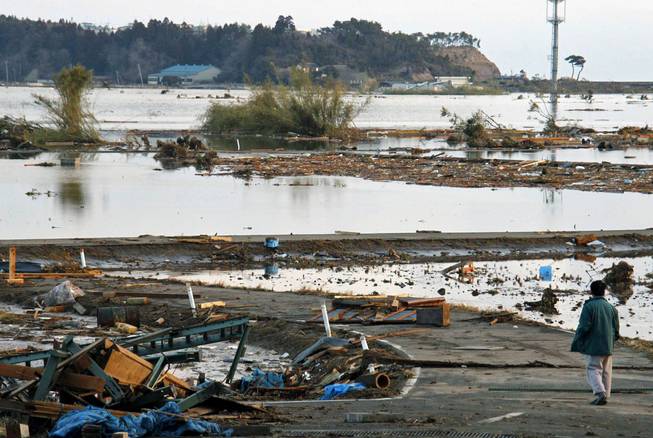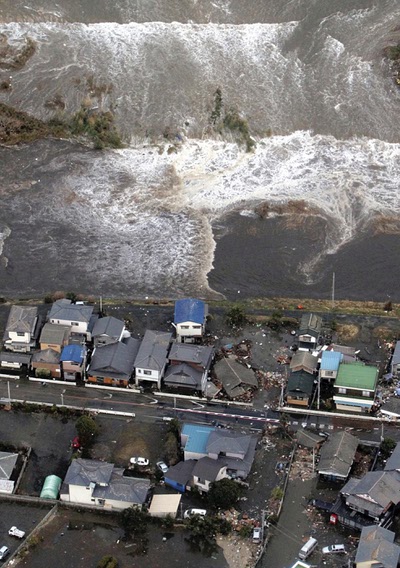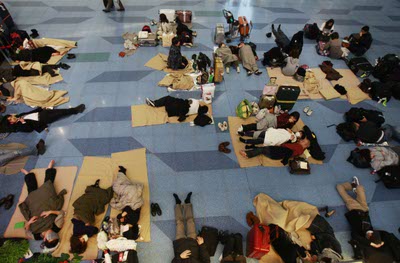
AP Photo/Kyodo News
A man looks over the area submerged in water from tsunami in Soma, Fukushima Prefecture, Saturday morning, March 12, 2011 after Japan’s biggest recorded earthquake slammed into its eastern coast Friday.
Friday, March 11, 2011 | 5:43 p.m.
Japan earthquake
KSNV coverage of local ties to earthquake in Japan, March 11, 2011.
It’s called the “Ring of Fire” for a reason, which is why panic didn’t immediately set in when Las Vegas resident Ryo Ishibashi first heard another earthquake had rattled his native country in the tremor-filled Pacific Basin.
“To a point, people become numb to it and used to it,” he said Friday.
But this one was different, as Ishibashi soon found out from reports via an online Japanese news site. The 8.9-magnitude earthquake off Japan’s northeastern shore Friday unleashed tsunami waves that decimated nearby towns and sent waves across the Pacific Ocean.
Ishibashi, who moved to the United States as a child, quickly e-mailed his parents, who live in Japan.
His father replied with a brief but relieving message: He and Ishibashi’s mother were safe, but they did feel the earthquake from Nagoya, a city in central Japan south of the epicenter.
“He told me it was quite violent,” Ryo Ishibashi said. “All he could say was he doesn’t know the extent of the damages.”
Now the waiting game begins. Are other family members safe? How will the fifth-largest earthquake in recorded history affect the nation’s economy?
Henderson resident Izumi Blair is still waiting for the answer to that first question. She hasn’t been able to get in touch with any of her family members in Japan, although none of them live near where the earthquake and tsunami hit.
“I want to know more details or information because it’s kind of scary,” said Blair, who works at the Japan Creek Market on Eastern Avenue in Las Vegas. She moved here in 1996.
Despite watching television reports with footage of the destruction, Izumi said the totality of the situation hasn’t registered yet.
“I just cannot believe it,” she said. “I see the news and the tsunami. We don’t think it’s happening in Japan.”
As the Japan business developer for the Ultimate Fighting Championship, Ishibashi said he travels to Japan every two or three months and is confident its citizens will begin a relatively speedy recovery.
“Japan has been through this before,” he said, “and I think the buildings are a little more well-designed to withstand the impact of earthquakes.”
Kathleen Blakely, honorary consul general of Japan in Las Vegas, agreed, citing what she called the country’s “strong sense of cooperation.”
“They really do try to help one another,” she said. “I really do believe they’ll be able to pull out of this.”
Even so, grief and fear persist as aftershocks continue moving south through Japan, Blakely said.
“It’s cold. It’s dark. It’s very scary for people,” she said Friday before the sun came up in Japan. “I just feel terrible for them.”
For Nevadans seeking information about family or friends in Japan, Blakely suggested first trying cell phones, e-mail or social networking sites. If those methods are unsuccessful, people can call 1-888-407-4747, a hot line established to inquire about relatives, she said.



Join the Discussion:
Check this out for a full explanation of our conversion to the LiveFyre commenting system and instructions on how to sign up for an account.
Full comments policy